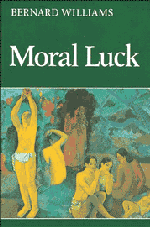Book contents
- Frontmatter
- Contents
- Preface
- Acknowledgements
- 1 Persons, character and morality
- 2 Moral luck
- 3 Utilitarianism and moral self-indulgence
- 4 Politics and moral character
- 5 Conflicts of values
- 6 Justice as a virtue
- 7 Rawls and Pascal's wager
- 8 Internal and external reasons
- 9 Ought and moral obligation
- 10 Practical necessity
- 11 The truth in relativism
- 12 Wittgenstein and idealism
- 13 Another time, another place, another person
1 - Persons, character and morality
Published online by Cambridge University Press: 05 June 2012
- Frontmatter
- Contents
- Preface
- Acknowledgements
- 1 Persons, character and morality
- 2 Moral luck
- 3 Utilitarianism and moral self-indulgence
- 4 Politics and moral character
- 5 Conflicts of values
- 6 Justice as a virtue
- 7 Rawls and Pascal's wager
- 8 Internal and external reasons
- 9 Ought and moral obligation
- 10 Practical necessity
- 11 The truth in relativism
- 12 Wittgenstein and idealism
- 13 Another time, another place, another person
Summary
Much of the most interesting recent work in moral philosophy has been of basically Kantian inspiration; Rawls' own work and those to varying degrees influenced by him such as Richards and Nagel are very evidently in the debt of Kant, while it is interesting that a writer such as Fried who gives evident signs of being pulled away from some characteristic features of this way of looking at morality nevertheless, I shall suggest later, tends to get pulled back into it. This is not of course a very pure Kantianism, and still less is it an expository or subservient one. It differs from Kant among other things in making no demands on a theory of noumenal freedom, and also, importantly, in admitting considerations of a general empirical character in determining fundamental moral demands, which Kant at least supposed himself not to be doing. But allowing for those and many other important differences, the inspiration is there and the similarities both significant and acknowledged. They extend far beyond the evident point that both the extent and the nature of opposition to Utilitarianism resembles Kant's: though it is interesting that in this respect they are more Kantian than a philosophy which bears an obvious but superficial formal resemblance to Kantianism, namely Hare's. Indeed, Hare now supposes that when a substantial moral theory is elicited from his philosophical premisses, it turns out to be a version of Utilitarianism.
- Type
- Chapter
- Information
- Moral LuckPhilosophical Papers 1973–1980, pp. 1 - 19Publisher: Cambridge University PressPrint publication year: 1981
- 195
- Cited by



